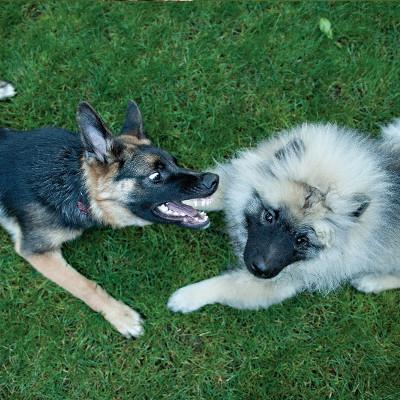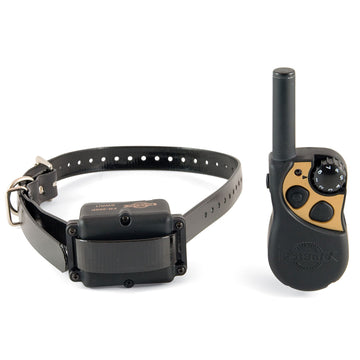By Darcy Lockman for The Dog Daily
 New York City graduate student Lacey Brown was walking her roommate’s German Shepherd last fall when the dog lunged and bit an elderly neighbor on the wrist. “The dog had been growling at people when we were out together, something he never did when he was with his owner,” she laments. “I should’ve stopped walking him when the growling began.”
New York City graduate student Lacey Brown was walking her roommate’s German Shepherd last fall when the dog lunged and bit an elderly neighbor on the wrist. “The dog had been growling at people when we were out together, something he never did when he was with his owner,” she laments. “I should’ve stopped walking him when the growling began.”
Dr. Katy Nelson, an emergency veterinarian in Virginia, concurs: “You have to know your dog and what it’s capable of. This dog probably viewed his owner as the alpha, and the roommate as the beta -- the dog was protecting Lacey, whom he considered to be his. You have to make sure your dog knows you’re higher in rank to prevent incidents like this one from happening.”
The Facts on Dog Bites
According to the Centers for Disease Control, over 4.5 million Americans are bitten by dogs each year. Of those, one in five requires medical attention. Additionally, around 31,000 people need reconstructive surgery each year as a result of a dog bite. Children are most likely to be the victims of dog biting incidents, as are people with multiple canines in their home. To raise awareness and combat dog biting, the American Veterinary Medical Association sponsors National Dog Bite Prevention Week each May.
Protect Yourself and Your Pet
In honor of National Dog Bite Prevention Week, Nelson offers the following advice on protecting yourself and your pet from strange dogs -- and protecting strangers from your best friend:
-
 Don’t make assumptions based on breed. “Sure, pugs and golden retrievers generally have gentle temperaments, but every single breed is going to have an exception to the rule,” emphasizes Nelson. “I’ve seen everything from aggressive pugs to pit bulls who like to roll around on the floor kissing their owners.”
Don’t make assumptions based on breed. “Sure, pugs and golden retrievers generally have gentle temperaments, but every single breed is going to have an exception to the rule,” emphasizes Nelson. “I’ve seen everything from aggressive pugs to pit bulls who like to roll around on the floor kissing their owners.”
- Ask permission. Never touch a strange dog -- or let your own furry friend approach another dog -- without first checking with its owner. “It dumbfounds me when people let their kids walk around my waiting room petting the dogs there, but I see it all the time,” says Nelson. Most people will be happy to tell you if their companion is good with strangers in general, and with children and other dogs specifically.
- Proceed with caution. “Just because someone says their dog is great with people and other pets doesn’t mean they’ll be great with you or your pet at that moment,” warns Nelson.
- Be aware of your body language. Dogs are more likely to bite when they are anxious. Approaching them in the wrong way can only exacerbate their anxiety. Nelson recommends sticking your hand out, palm facing up, for the animal to sniff. “If it’s a big dog, I might do this from a standing position,” she says. “With a smaller dog, I crouch down. If you move toward them with a non-aggressive posture, you decrease the likelihood of aggression coming back at you.”
Protecting Others From Your Dog
-
 Know your dog. Be realistic and honest with other people about what your dog is capable of. If your dog is a biter, it’s up to you to prevent it. Know your pet’s telltale signs of anxiety and aggression: If its ears go back and its hackles go up, the dog is saying it’s uncomfortable and needs to get out of its current situation.
Know your dog. Be realistic and honest with other people about what your dog is capable of. If your dog is a biter, it’s up to you to prevent it. Know your pet’s telltale signs of anxiety and aggression: If its ears go back and its hackles go up, the dog is saying it’s uncomfortable and needs to get out of its current situation.
- Teach your dog who’s boss. In her own home, Nelson has made sure her dogs know that her 2-year-old son is alpha to them. “It’s a daily thing in my house, showing them that I’m first, then my son and then them,” she says. Nelson does this by monitoring all dog-child interactions and quickly putting a stop to it if one of the dogs tries to challenge the boy.
- Minimize your furry friend’s anxiety. If you know your dog gets excessively anxious in the presence of strangers or at the dog park, lock it up in your bedroom when friends visit, and don’t take it to the playground. Keeping your dog calm will minimize the chance that it will become aggressive.
Lucky for Lacey Brown, her roommate’s Shepherd only broke her neighbor’s watch -- and not his skin. “The man was angry, and I felt horrible, but it could have been worse,” she says. With Nelson’s advice, Brown doesn’t have to worry about the Shepherd’s bad habits any more.
Darcy Lockman is a freelance writer and frequent contributor to The Dog Daily. Her work has appeared in The New York Times and Rolling Stone. She lives in Brooklyn with the prettiest pug dog in the five boroughs.



